Aintree Grand National Betting: Favourite or Outsider?
 I remember my first ever winning Grand National bet.
I remember my first ever winning Grand National bet.
Aldaniti in 1981. I’m not sure if it’s legal, but I was eleven-years-old. To think some of the horses were older than me. Obviously, I didn’t place the bet myself. My Dad must have done the honours and my 50p each-way come up trumps.
I think I won £6.
I probably bought a bag of penny sweets: pink shrimps, bananas, flumps, milk bottles, blackjacks and a quarter of dolly mixture. No wonder I felt sick after that win. Living a life of excess. Like you do at eleven.
It was only in later life I appreciated the story behind the success of both horse and jockey. Bob Champion who had recovered from cancer and Aldaniti who had suffered from chronic leg problems. It was a story which touched the heart and was made into a flim, Champions, starring John Hurt. The musical score composed and conducted by Carl Davis. The start of the film is very moving and it often brings me to tears.
To be fair, I’ve hit a barren spell. In recent years, National winners have been few and far between. Sometimes you win, sometimes you lose. It’s virtually impossible to draw!
However, I have one question: Is it best to bet on the Grand National favourite or plump (if that’s the right word, sound like something you do with cushions) for the outsider?
Statistically, the favourite ‘must’ have a better chance of winning. I’m trying to tell myself this as I write these words. But on the other side of the coin, if I was a gambling man, there have been a number of outsiders win.
I’m thinking how much money would I like to win.
Should I bet on a horse priced at 1000000/1?
My horse would have three legs, one eye, half a tail and call to the name, Lucky.
Obviously, that is a joke.
His name would be Clip Clop The Cyclops
Over the years there have been 5 winners at 100/1.
1928 – Tiperary Tim
1929 – Gregalach
1947 – Caughoo
1967 – Foinavon
2009 – Mon Mome
Considering there have been at least 175 runnings, that’s about a 3% win rate. However, when you divide it by 5000 horses, the odds are probably horrenous. I really don’t know how many horses have run in the Grand National at odds of 100/1 or more. I have no idea. In fact, I doubt there are many people on the planet who do.
One or two Anoraks (people who obssess over data).
Anyway, perhaps we have learned something, it doesn’t pay to bet over 100/1.
Just saying.
But what about betting on the favourite? Less winnings, but, supposedly, more chance of winning.
2024: I Am Maximus won at odds of 7/1.
In the last 14 runnings, there have been 4 favourites go in. The good old jolly as they call it.
Let’s have a look at the winners:
2010 – Don’t Push It 10/1
2019 – Tiger Roll 4/1
2023 – Corach Rambler 8/1
2024 – I Am Maximus 7/1
Decisions, decisions.
Is it better to think somewhere in the middle? Halfway house and all that.
The average odds of recent winners is 22/1.
That average includes: 10/1, 14/1, 33/1, 66/1, 25/1, 25/1, 33/1, 14/1, 10/1, 4/1, 11/1, 50/1, 8/1 & 7/1.
The form students will tell you to look at the form. The optimist will tell you to bet the outsider. The pesimist will put their stamp on the favourite.
While your old aunt will pick a horse because of its name.
 It sounds a bold claim.
It sounds a bold claim. Of all the three Nationals, the Welsh is the first on the list for punters. It takes place on the 27th December at Chepstow over 3 miles and 6 ½ furlongs. This Premier Handicap National Hunt steeplechase is the feature of this idiosyncratic left-handed racecourse. With 23 fences it has fewer obstacles than Aintree or Scottish Grand National.
Of all the three Nationals, the Welsh is the first on the list for punters. It takes place on the 27th December at Chepstow over 3 miles and 6 ½ furlongs. This Premier Handicap National Hunt steeplechase is the feature of this idiosyncratic left-handed racecourse. With 23 fences it has fewer obstacles than Aintree or Scottish Grand National. The emphasis of this website is to detail the Aintree Grand National. However, it is important to remember there are other ‘Nationals’ on the Racing Calender, including both Scottish and Welsh.
The emphasis of this website is to detail the Aintree Grand National. However, it is important to remember there are other ‘Nationals’ on the Racing Calender, including both Scottish and Welsh. If you are reading this article, the 2025 Aintree Grand National may be on the horizon. Perhaps you are interested in placing a bet on the most famous steeplechase of them all. I remember watching my first National bet back in 1981.
If you are reading this article, the 2025 Aintree Grand National may be on the horizon. Perhaps you are interested in placing a bet on the most famous steeplechase of them all. I remember watching my first National bet back in 1981.